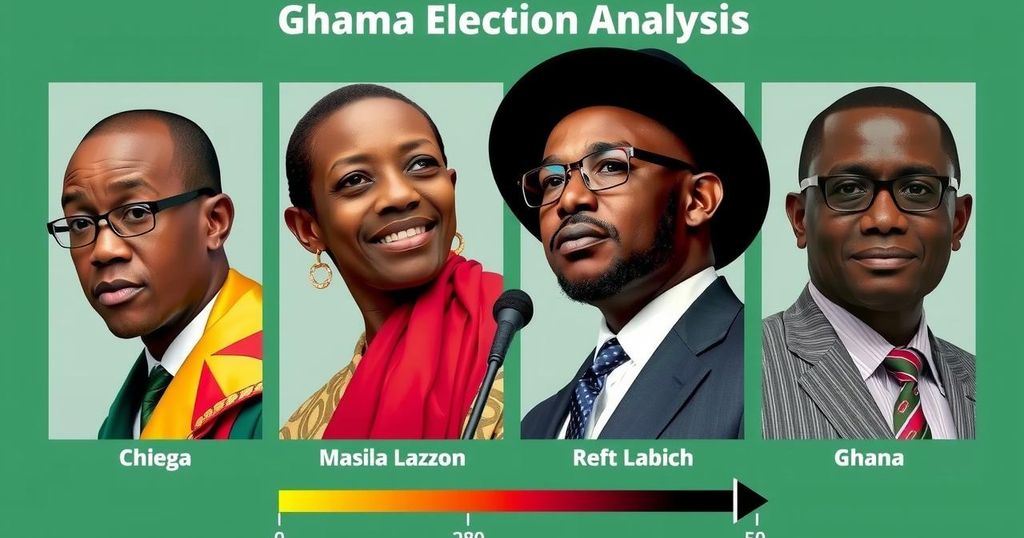Ghana 2024 Elections: NPP Defeated by NDC Amid Economic Discontent

The 2024 Ghana elections led to the defeat of the ruling NPP by the opposition NDC, driven largely by public dissatisfaction over economic issues, high inflation, and corruption. Despite the NPP’s campaign promises, voters opted for change due to worsening living conditions and ineffective government management. This election represented a significant shift in Ghana’s political scene, reflecting broader trends in African governance.
The recent elections in Ghana resulted in a significant defeat for the ruling New Patriotic Party (NPP) led by President Nana Akufo-Addo and Vice President Dr. Mahamudu Bawumia as they lost to the opposition National Democratic Congress (NDC) headed by John Mahama. The NPP had aimed to create history by remaining in power for more than eight years, but widespread dissatisfaction regarding the economic crisis, high inflation, unemployment, and corruption led voters to opt for change. Many Ghanaians expressed their frustrations over the government’s handling of the economy and living expenses, which exacerbated their decision at the polls.
Political analysts indicated that the prevailing economic difficulties, particularly inflation reaching as high as 54% in 2023, significantly influenced voter sentiment. Pre-election surveys conducted by firms like Global Info Analytics indicated a clear trend toward NDC among numerous voters, especially the youth. Promises made by the NPP, such as the introduction of free senior high school education and digitalization efforts, were overshadowed by pressing concerns over food affordability and basic necessities.
While the NPP campaigned on their past achievements, many felt that the burden of taxation, including a COVID-19 levy and various other taxes, contributed to economic hardships. Furthermore, allegations of corruption and mismanagement under the NPP government, coupled with concerns over illegal mining activities, intensified voter grievances.
The electoral outcome marked not only a loss of power for the NPP but also significant parliamentary seat losses, reflecting a broader trend across several African nations this election year where ruling parties encountered similar challenges amid economic crises. The decisive defeat underscores a mobilized opposition and heightened expectations for governmental accountability among the electorate.
The 2024 Ghanaian elections represented a pivotal moment in the country’s political landscape, revealing a historic change in leadership after years under the NPP. Traditionally, Ghanaian political patterns show that no ruling party has maintained power for more than eight years since the establishment of multiparty democracy in 1992. The constitutional term limit of four years has led to voters regularly reassessing their government’s performance. In the context of rising public discontent stemming from severe economic challenges, this election’s results illuminate the various socioeconomic factors contributing to the electorate’s choices.
The recent electoral results in Ghana symbolize the electorate’s desires for economic reform and accountability from their government. The NPP’s inability to effectively address the economic crisis, manage public expectations, and tackle corruption has ultimately led to their electoral downfall. The shift in political power to the NDC underscores a critical need for change in governance and offers an opportunity for renewal in addressing Ghana’s pressing socioeconomic challenges.
Original Source: www.bbc.com







